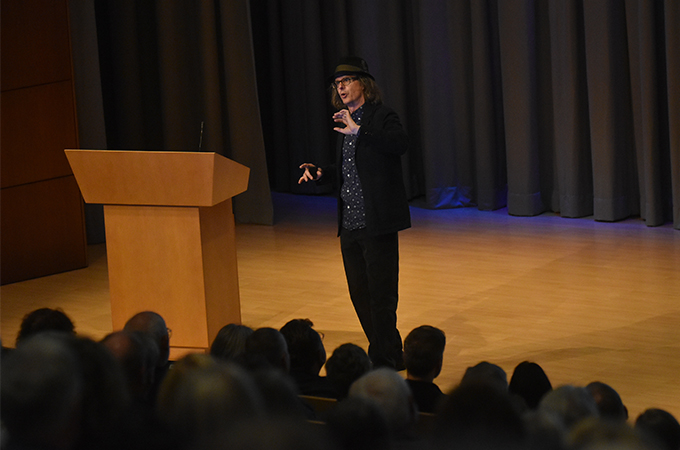“Education is not the filling of a pail but the lighting of a fire,” said winemaker Wes Hagen ’92, quoting poet William Butler Yeats before beginning his talk on the history of wine at a recent Redlands Forum event. Hagen thanked his past teachers, professors, and mentors—including Bill McDonald, professor emeritus at U of R’s Johnston Center for Integrative Studies—for encouraging him to pursue his passions, which ultimately led to a successful career in the wine industry.
At the University of Redlands, Hagen studied English and education, but says his life was changed when McDonald suggested he read the work of chemist and archaeologist Patrick McGovern. Hagen’s talk, titled "The History of Wine: From Pangaea to Pasteur," drew on McGovern’s research and writing on the biomolecular archaeology and history of fermented beverages.
Hagen is the consulting winemaker and brand ambassador for J. Wilkes Wines in Santa Maria Valley, California. He has over 20 years of experience working as a vineyard manager and winemaker and has written about wine for Los Angeles Times Magazine, Sommelier Journal, and Burgundy Report. In 2013, he was included in a list of the 100 most influential winemakers in the country.
“Yeast is humanity’s oldest industrial microorganism,” he said, explaining that 8,000 years ago societies were fermenting wine in clay jugs. Before anything was known about the science of fermentation, yeast from the air would interact with juice from grapes to eventually produce wine. In cases where there wasn’t enough yeast in the air, a fig would be thrown into the vessel to hasten the process. A wasp was often embedded inside the fig, and the yeast from the wasp’s gut would ferment the juice.
Archaeological evidence has been found in the Zagros Mountains of northern Iran that suggests the existence of an economy based on wine. People in this community created bunkers in the mountains, lined them with clay, and filled them with juice, using temperature control to create wine.
Wine was important in these ancient societies for many reasons, said Hagen. Alcohol eased social tensions, cemented reciprocal relationships, and often was part of shamanistic rituals, leading people to religious and spiritual experiences.
While the Romans were responsible for bringing wine culture to most of Europe, Hagen revealed that Africa had a clearly established wine industry before Europe ever saw a grapevine. Egyptians had been planting vineyards and making wine on their own long before their methods were carried across trade routes to the other side of the Mediterranean Sea.
Nearing the end of his talk, Hagen elaborated on the impact of wine starting with the fact that Johannes Gutenberg’s first printing press was originally a wine press. “Louis Pasteur’s studies on fermentation led to germ theory, which is the basis for all clinical medical practice,” he said.
Before leaving the stage, Hagen fielded questions from the audience. One person asked him why wine has such a large price range. After revealing that bottles under $20 usually contain grapes that are picked by a machine while bottles over $20 contain grapes that were picked by hand, Hagen said, “A bottle of wine is an investment that keeps the people you love at the table for one more hour.”
Past Redlands Forums have featured speakers including historian Ed Ayers, activist Ralph Nader, biologist Jane Goodall, The Atlantic editor and correspondent Jim Fallows, former Governor of Arizona and former U.S. Secretary of the Interior Bruce Babbitt, and other leaders in their fields.
Next up in the Redlands Forum is Molly Burhans, a faith-based conservationist. Registration, which opens one week prior to the talk, is required. For more information on the series, see the Redlands Forum website.
Or learn more about U of R's Johnston Center for Integrative Studies.






